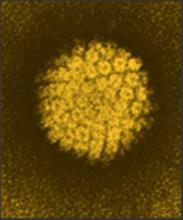WASHINGTON – Adolescent males are significantly less likely to receive the human papillomavirus vaccine than females, largely because of the lack of information about the vaccine provided to their parents, based on an analysis of data from a statewide survey.
Researchers found that only 14% of males had initiated HPV vaccination compared with 44% for females, based on answers of 751 parents of adolescents (aged 11-17 years) who completed the 2010 North Carolina Child Health Assessment and Monitoring Program (CHAMP) – a statewide telephone survey.
In addition, HPV vaccine uptake in males was correlated with older age, minority race, a lower household income, and other vaccine use in the family. For females, HPV vaccine uptake was associated with older age and public school attendance.
The researchers also assessed parental reasons for not vaccinating their child against HPV. "We found that correlates and concerns related to HPV vaccine initiation varied for boys and girls," the researchers noted in a poster presented at the annual meeting of the American Society for Preventive Oncology. Parents of boys most often cited not getting a recommendation from their health care provider or not knowing that the vaccine was available for boys. Parents of girls most often reported concerns about safety and side effects.
Almost half of parents (48%) reported on a male index child. The mean age of the adolescents was 14 years. Most parents reported on children who were non-Hispanic white (69%) or black (20%). Males and females did not differ in terms of 13 sample characteristics assessed.
"Our findings underscore the importance of health care provider recommendation of the HPV vaccine," wrote lead author Melissa B. Gilkey, Ph.D., and her coinvestigators. Dr. Gilkey is a researcher at the Lineberger Comprehensive Cancer Center at the University of North Carolina (UNC) at Chapel Hill.
"The difference in coverage between sons and daughters in our sample is not surprising, as our study was conducted soon after licensure for males," they reported.
It’s hoped that new guidelines on HPV vaccination from the Centers for Disease Control and Prevention are likely to increase boys’ access to the HPV vaccine, as private insurers typically cover the cost of vaccines that are recommended for routine use. "However, the experience with girls suggests that achieving widespread coverage among boys will require a concerted effort," the researchers pointed out. Recommending HPV vaccine alongside other adolescent vaccines is a strategy that may be particularly well suited for addressing the very low levels of uptake among boys."
The study was supported by GlaxoSmithKline, the maker of Cervarix vaccine against HPV types 16 and 18, the cancer control education program at UNC Lineberger, and a National Research Service Award in primary medical care. The investigators did not report whether they had any relevant financial disclosures.


